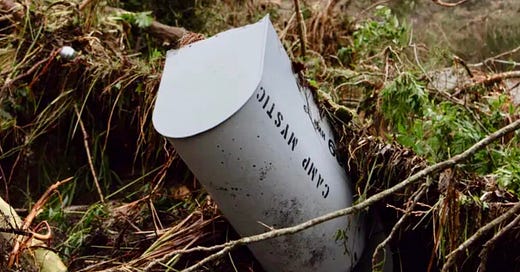Pressing pause on Walk Straight for a moment, as I walk … Into The Mystic.
I am a Mystic Girl. Tonkawa, 2nd Term, 6 summers. A family, not just a camp, built on legacy, ritual, and values passed down through generations. We didn’t just grow up at Mystic, we were guided. Shaped in ways that took years, sometimes decades, to fully understand. When the tragedy unfolded over the 4th of July weekend, the shock was immediate, and so was the rush to define it. It was striking how quickly Camp Mystic was reduced to labels, even as the full scope of what happened was still coming into view. Labels ripe for projection and stereotypes that undermine the lifelong passion, devotion, and work generations have built and experienced. Simplicity flattens reality.
Young girls and women were not sent to Mystic to play and be pampered. Yes, we absolutely played, but while we were busy playing, Mystic was hard at work with other important pursuits.
We lived in plain wooden cabins with unfinished walls, thick nests of daddy-longlegs claiming most corners. We tried to stay cool overnight and during the mandatory quiet time, often in 90-plus degrees, using fans brought from home. My favorite had translucent blue blades and different settings on the front of the base, so you didn’t have to reach around the back. We all knew the difference between a/c and fans, but we learned to deal with the discomfort, adapt, and move beyond it. This was how our grandparents had grown up, and those before them, and before them. We learned to value history and appreciate the advances in technology we had once taken for granted.
We brought our things with us in trunks, including the bedding for our military-style bunk beds. We were expected to keep our beds made, trunks organized, and spaces tidy. We were also responsible for keeping our cabins clean over the term, rotating between the various chores. There were inspections, and we wanted to pass. We learned that how we maintained our own things affected the people around us. We came to understand that being part of a community meant doing your part.
Like the men and women who served our country, we went to sleep with a solo bugle rendition of Taps playing on all the loudspeakers throughout the camp and woke in the morning to Reveille. Through all our groaning, we thrived within these musical bookends.
Given the opportunity to choose our activities and create our own schedules within the camp’s structure, we had the freedom to pursue what we were drawn to, discover where our natural abilities lived, and prioritize their importance. We also learned discipline, even as very young children, to follow a schedule and be on time.
There was a snack bar where parents could deposit an allowance or credit for each camper. Some children had very modest allowances, while others seemed to have endless amounts. We gained perspective, gratitude, and self-regulation.
The oldest girls were admired, held up as role models, tribe leaders, and central figures in sacred camp tradition. But they also waited on us at meals in the dining hall. While we were being taught the importance of service with words, we were also living it, gently, by example. Leadership and service weren’t separate; every role had value, and respect wasn’t reserved for status.
Non-denominational services and Vespers were held on Chapel Hill and sometimes on the bank of the Guadalupe River. Wearing white, we would wind up the stone stairs to a round clearing surrounded by rocks and foliage. Benches filled the space, with an old wooden cross at the front. Poems, scripture, and stories were read mostly by campers and counselors. We’d sing songs focused on love and friendship. Absorbing lessons on faith, love, compassion, and service from your peers, surrounded by nature, makes an impression.
Mystic in the 1970s held something special. Iney and Frank Harrison were at the helm, and Ag Stacey, the camp’s formidable founder and Dick Eastland’s grandmother, still returned to visit. It was also the era when Tweety and Dick Eastland arrived on the scene, a natural continuation of everything Mystic stood for.
There was also a flood in that decade. In 1978, sandwiched between the floods in ‘36, ‘52, ‘87, and ‘98. I remember watching the water rise to the tree in front of my cabin, where we’d taken our group photo just days before. It was scary, but never in a million years did I believe I was in real danger. We were at Mystic. We were safe.
That belief, of Mystic being safe, of being held, was shattered this week. And while I don’t have words big enough to hold that loss, I do know this: Mystic wasn’t about comfort. It was about growth. It wasn’t about privilege. It was about participation. It wasn’t about exclusion. It was about inclusion, in the truest sense, showing up, pitching in, and learning to coexist. It formed us, and it gave us more than we could ever put into words. Thank you to the heroes. To those who gave their lives selflessly, and those still in action. To those who built Mystic, who chose it, and who stewarded it through the years, thank you. We carry you forward. And to those lost this week, and the grieving families, may you feel our love. Our reverence. Our heartbreak. You are not a headline, you are part of something sacred.





This is so beautiful. What a loving and resonant tribute.
Hey! I saw your post on my homepage and wanted to drop by and send you some good vibes. Whenever you have a moment, I’d be grateful if you could do the same. I’m always happy to support and lift each other up!